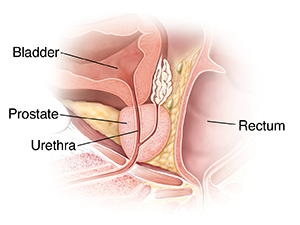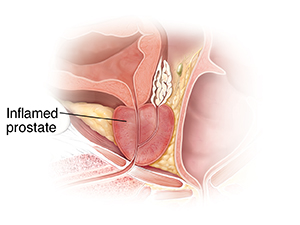Bacterial Prostatitis
The prostate gland is part of the reproductive system for people who are assigned male at birth. The gland sits just below the bladder. It surrounds the urethra. This is the tube that carries urine and semen out of the body. Bacterial prostatitis is an infection of the prostate that causes the prostate to become painful and swollen. The problem often occurs suddenly with possible severe symptoms noted below.
 |
| With a healthy prostate, urine flows easily through the urethra. |
 |
| With a swollen prostate, the urethra narrows. It’s harder for urine to go through. |
Causes and symptoms
Bacterial prostatitis is caused by infection with germs (bacteria). This infection makes the prostate swell. This squeezes the urethra, narrowing or blocking it. It can be caused by a biopsy or surgery, urine blockage, an injury to the genitals, or a sexually transmitted infection (STI). Symptoms may be bad. They can include:
-
Fever and chills
-
Low back pain
-
Having to pee often
-
Pain when peeing
-
A weaker pee stream
-
Needing to strain to pee
-
Inability to pee
Treatment
The infection is treated with antibiotics. Take all of the medicine until it's gone, even if you start to feel better. If you don’t, the infection may come back. And it may be harder to treat. Your healthcare provider may also suggest resting, pain medicine, stool softeners, and drinking more fluid. Follow any instructions you're given.
Chronic bacterial prostatitis
Prostatitis can turn into a long-term (chronic) problem. In this case, the prostate stays swollen and inflamed despite treatment with antibiotics. One possible cause is repeated infections that may not have fully resolved. Symptoms include pain and burning when peeing, and needing to pee often. It may also cause lower belly or back pain. If you have this problem, your healthcare provider will talk with you about a treatment plan. Treatment is often taking antibiotics for 6 to 12 weeks. In addition to antibiotics, other treatments may include anti-inflammatory medicines, muscle relaxants. and sitz baths.